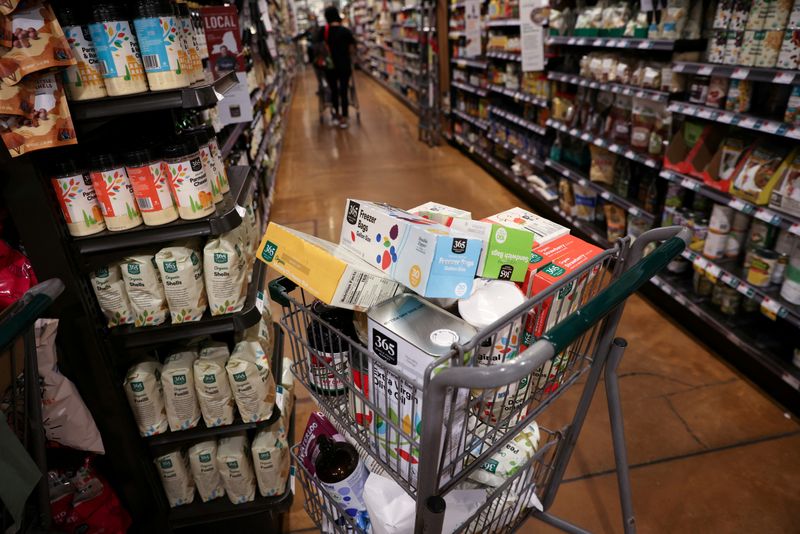A look at the day ahead in U.S. and global markets from Mike Dolan.
If U.S. consumers are the significant engine of global growth, then their roaring start to this year is zapping recession fears and investors appear happy for now that will trump any related rethink on higher borrowing costs.
Jumping 3% at almost twice the pace expected, retail sales increased by the most in nearly two years in January as households seemingly shrugged off rising prices and soaring borrowing costs.
While there were some questions about seasonal adjustments in the data, economists were impressed that sales growth was pretty broad based and have scrambled to re-crunch first quarter U.S. output forecasts as a result.
JPMorgan (NYSE:JPM) doubled its first-quarter GDP growth forecast to a 2% annualized rate - only a modest slowdown from the 2.9% rate in the last three months of 2022 - and Goldman Sachs (NYSE:GS) lifted its tracking estimate by 0.6 percentage point to 1.4%.
And it's not just consumption. Production at U.S. factories rebounded 1.0% in January too, while surveys showed business conditions in New York state improving sharply in February.
There may be a more mixed picture from Thursday's data slate on producer prices, housing starts and weekly jobless claims.
But one the most remarkable aspect of this week's economic readouts is that the related hawkishness from the Federal Reserve on inflation and interest rates has not bowled over the stock market - in stark contrast to how equities greeted rising rate projections last year.
Can a stronger economy now take higher rates more comfortably? Even though rates futures and Treasury yields ticked back a bit today, pricing now has Fed policy rates moving as high as 5.25% and staying above 5% all year.
And while full-year earnings growth estimates for S&P500 companies have sunk to zero, consensus forecasts are now pencilling in a rebound of almost 12% next year.
For all the turbulence in borrowing markets, the VIX index of implied volatility remains subdued below long-term averages.
U.S. stock futures are flat going into Thursday's open and European and Asia stocks were up smartly. The dollar edged back a bit but remains almost 3% up on the low of early February.
That relative serenity comes even with the U.S. debt ceiling row brewing in the background.
The Congressional Budget Office on Wednesday said the U.S. Treasury Department will exhaust its ability to pay all its bills sometime between July and September, unless the current $31.4 trillion cap on borrowing is raised or suspended.
Uncertainty about the pace of growth and annual tax receipts in April makes it difficult for government officials to predict the exact "X-date", it said.
Overseas, the gloom surrounding Britain's economy was not reflected in the record run in its leading blue-chip stock index.
The UK's export, banking and commodity-heavy FTSE 100 rose to another record high above 8,000 points, underpinned by corporate earnings from Centrica (OTC:CPYYY) and Standard Chartered (OTC:SCBFF). Shares of Centrica jumped to top the FTSE 100, adding 4.2%, after the British gas owner's annual profit more than tripled and as it announced an extension of its share buyback programme.
Standard Chartered also jumped as it raised its performance goals, unveiled a new $1 billion share buyback and produced a 28% rise in annual profit as global interest rates rise. StanChart said almost half its 10% income growth came from interest.
For inflation-watchers, the world's biggest food group Nestle said it will push through further price increases this year after more expensive ingredients contributed to lower 2022 profits. "Our gross margin is down about 260 basis points - that is massive," said Chief Executive Mark Schneider.
Planemaker Airbus gained 2.9% as the company targeted 2023 jet deliveries in line with its original estimate for last year.
And in the tense geopolitics between Washington and Beijing, China's commerce ministry on Thursday said it put Lockheed Martin (NYSE:LMT) and Raytheon Technologies (NYSE:RTX) onto an "unreliable entities list" over arms sales to Taiwan.
Key developments that may provide direction to U.S. markets later on Thursday:
* U.S. Jan producer prices, housing starts and permits; weekly jobless claims; Philadelphia Fed's Feb business survey, New York Fed's Feb service sector survey; NY Fed's Q4 2022 Household Debt and Credit Report
* U.S. Fed Board Governor Lisa Cook, St. Louis Fed President James Bullard, Cleveland Fed chief Loretta Mester all speak; Bank of Canada governor Tiff Macklem speaks; European Central Bank Vice President Luis de Guindos, ECB chief economist Philip Lane, ECB board member Fabio Panetta, Bundesbank chief Joachim Nagel, Irish central bank chief Gabriel Makhlouf all speak; Bank of England chief economist Huw Pill speaks.
* U.S. corp earnings: Applied Materials (NASDAQ:AMAT), DoorDash, Paramount, Hasbro (NASDAQ:HAS), Consolidated Edison (NYSE:ED), Digital Realty (NYSE:DLR) Trust, Bio Rad Labs, West Pharmaceutical, Constellation Energy, Vulcan Materials (NYSE:VMC), Southern, Entergy (NYSE:ETR), Zebra, Henry Schein (NASDAQ:HSIC), Organon, Epam, Pool (NASDAQ:POOL) etc
GRAPHIC: US and Europe earnings growth forecasts (https://fingfx.thomsonreuters.com/gfx/mkt/egpbyadxkvq/One.PNG)

GRAPHIC:U.S. Retail sales (https://www.reuters.com/graphics/USA-STOCKS/akpeqmkadpr/rs.png)
GRAPHIC:Industrial production 9https://www.reuters.com/graphics/USA-STOCKS/jnpwyxnwnpw/indprod.png)
(By Mike Dolan, editing by Jane Merriman mike.dolan@thomsonreuters.com. Twitter: @reutersMikeD)